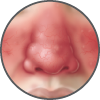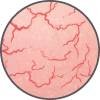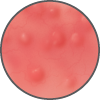Frequently Asked Questions about Rosacea
WHAT IS ROSACEA?
 |
Rosacea is a chronic skin condition that mainly affects the skin on the face (cheeks, nose, chin, and forehead).1 |
 |
Symptoms may also spread beyond the face to the skin on the ears, scalp, neck, or chest.2 |
 |
Rosacea causes redness, visible blood vessels, and small, red, pus-filled bumps on the facial skin.3 |
 |
These signs and symptoms may flare up for weeks or even months, and then go dormant for a while.3 |
 |
Rosacea can be mistaken for acne, an allergic reaction, or other skin problems.3 |
WHAT CAUSES ROSACEA?
 |
Doctors do not know the exact cause of rosacea but believe that a tendency to develop the disorder may be genetic.4,5 |
HOW LONG DOES ROSACEA LAST?
 |
Rosacea is a chronic skin condition that typically presents in middle- and older-aged adults, and is more common in women and people with fair, sensitive skin.4 |
 |
In one small study, 52% of participants reported rosacea that came and went. This group experienced rosacea flare-ups for an average of 13 years. 48% of people who participated in the study had their rosacea clear up after an average of 9 years.6 There is no cure for rosacea, but it can be treated and controlled.4 |
